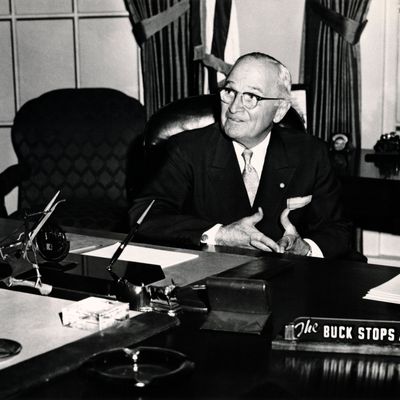
Harry Truman’s famous motto, “the buck stops here” — which was emblazoned on a thirteen-inch sign that sat on his Oval Office desk — is receiving a lot of renewed interest today. Mostly, it’s being used to criticize President Obama’s alleged willingness to allow Secretary of State Hillary Clinton to “take the fall” for the deadly attack on a diplomatic outpost in Benghazi, Libya. Conservatives from Jennifer Rubin, to Sean Hannity, to John McCain, and many others, seem to think that — just as Truman believed — Obama should take responsibility for everything that happens in his government. But “the buck stops here” actually means something different altogether, or at least it did to Truman. From the Truman Library’s website:
On more than one occasion President Truman referred to the desk sign in public statements. For example, in an address at the National War College on December 19, 1952 Mr. Truman said, “You know, it’s easy for the Monday morning quarterback to say what the coach should have done, after the game is over. But when the decision is up before you – and on my desk I have a motto which says The Buck Stops Here’ – the decision has to be made.” In his farewell address to the American people given in January 1953, President Truman referred to this concept very specifically in asserting that, “The President–whoever he is–has to decide. He can’t pass the buck to anybody. No one else can do the deciding for him. That’s his job.”
So the president’s decisions are his alone to make. That’s very different than the idea that the president must take responsibility for decisions he didn’t even make in the first place. And as Clinton acknowledged, micromanaging the security plans for the nation’s 275 worldwide diplomatic posts isn’t part of the president’s workload.
Mark Adams, the education director of the Harry S. Truman Library Institute, tells us he doesn’t quite get the comparison between the Libya example and Truman’s philosophy. “I don’t see the parallel in the analogy, because that decision may never have made it to President Obama’s desk,” Adams told us. “It may never have gotten that far up the food chain. But, I think with Truman, it’s when that decision does come to him, he’s going to make that decision, and he’s going to stand by it, and he’s not going to pass it on — pass the buck. But the difference would be whether that decision actually reached [Obama] or not, in the modern-day example.”
This doesn’t mean that it would be politically wise for Obama to tell 70 million debate viewers tonight, “Hey, not my fault. Take it up with Hillz.” Regardless of how Truman viewed buck passing, we like to believe that our presidents are in control of pretty much everything that happens on their watch, and when something goes wrong, blaming others just isn’t a very leaderly look.
But it does mean that, if Clinton is the one making decisions for embassy security, then, in the Trumanian sense, the buck really should stop with her. Some might argue otherwise — that Obama should take the blame for the State Department’s failures. But not Truman.





























